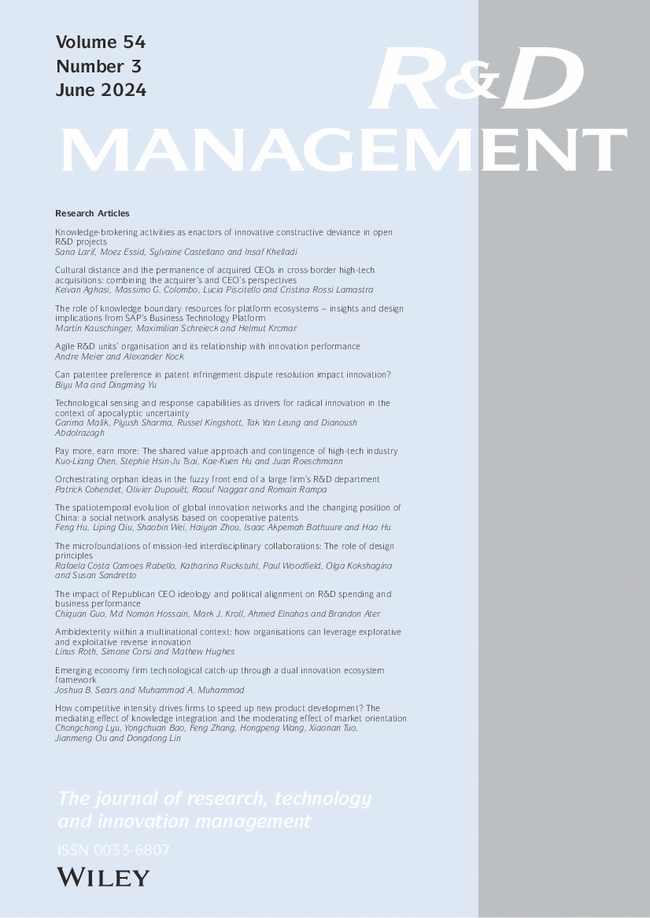在一家大公司研发部门模糊的前端策划孤儿创意
IF 5.7
2区 管理学
Q1 BUSINESS
引用次数: 0
摘要
模糊前端是创新过程的关键初始步骤,在此过程中,新想法会出现。当产生的想法与组织的方向或路线图一致时,这一步的功能就很好理解了。在这种情况下,有各种各样的管理方法可以指导、过滤和控制思想的发展,同时减少相关的风险。然而,我们对孤儿想法的出现和发展知之甚少,这些想法与公司的战略路线图不一致。这些孤立的想法超出了管理者的范围,因为它们与公司确定的方向和需求不一致。本文的目的是通过对hydro - quamesbec研究所三个意想不到的构思过程的定性研究来填补这一空白。我们的数据揭示了一个以正式和非正式机制和关系的复杂交织为特征的过程。特别是,我们的研究结果表明,非正式群体(可以被吸收为认知社区)通过负责价值主张的发展以及将想法整合到公司的管理和战略框架中,在孤儿想法之旅的第一阶段的协调中发挥了重要作用。此外,管理孤儿想法需要特定的管理手段和社会机制。本文章由计算机程序翻译,如有差异,请以英文原文为准。
Orchestrating orphan ideas in the fuzzy front end of a large firm's R&D department
The fuzzy front end is the critical initial step of an innovation process during which new ideas emerge. This step's functioning is well understood when the ideas produced are in line with the organisation's directions or roadmap. In that case, there are a variety of managerial methods available to guide, filter and control the development of ideas while reducing the associated risks. However, we know considerably less about the emergence and development of orphan ideas, that is ideas that are not aligned with the firm's strategic roadmap. Such orphan ideas are beyond the scope of managers because they are not consistent with the orientations and needs identified by the firm. The aim of this article is to start to fill this gap through the qualitative study of three unexpected ideation processes at Hydro-Québec's research institute. Our data reveal a process characterised by a complicated intertwinement of formal and informal mechanisms and relationships. In particular, our results show that informal groups, which can be assimilated to epistemic communities, play a major role in the orchestration of the first stages of the journey of orphan ideas by taking charge of the development of the value proposition and of the idea's integration in the firm's managerial and strategic framework. Further, managing orphan ideas requires specific managerial devices and social mechanisms.
求助全文
通过发布文献求助,成功后即可免费获取论文全文。
去求助
来源期刊

R&D Management
Multiple-
CiteScore
11.30
自引率
9.50%
发文量
0
期刊介绍:
R&D Management journal publishes articles which address the interests of both practising managers and academic researchers in research and development and innovation management. Covering the full range of topics in research, development, design and innovation, and related strategic and human resource issues - from exploratory science to commercial exploitation - articles also examine social, economic and environmental implications.
 求助内容:
求助内容: 应助结果提醒方式:
应助结果提醒方式:


